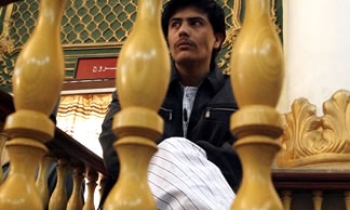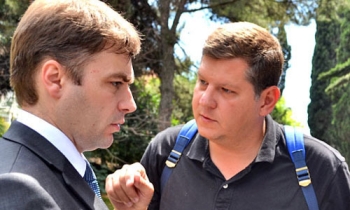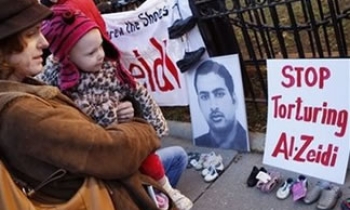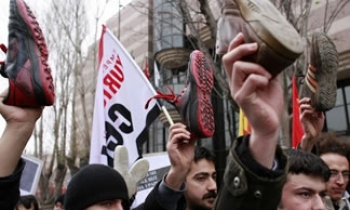(Article 19): Free speech, media and information flows increasingly ignore and elude physical frontiers or national boundaries. Many governments, fearful of this lack of control, are trying hard to restore or fortify barriers to trace, block, target and censor those who champion the truth.
No Frontiers
Throughout the last year a series of revelations have sent shockwaves across the world. Photos, reports, articles, messages and videos originating in one place are instantly shared with another. Outrage and embarrassment spread in equal measure, corruption is magnified, people-power amplified, and governments fall.
Wikileaks has revolutionised transnational whistleblowing. Today, people can publish information in the public interest regardless of where they live, and with minimal possibility of being traced. Information uploaded in New York can rapidly impact current affairs in countries as far removed as Nepal, Nicaragua, Nigeria or Norway. Wikileaks has proven so popular that there are now a number of similar websites, including: BalkanLeaks, BrusselsLeaks (European Union), IndoLeaks (Indonesia) OpenLeaks, RuLeaks (Russia), TuniLeaks (Tunisia) and TradeLeaks.
Kenya: A US diplomatic cable dated October 9, 2007 revealed to the Kenyan people the extent to which the Kibaki government had conspired to win the elections. Published in the Daily Nation, the US embassy claimed a Kibaki minister had briefed that an alternative Raila government would be bad for Kenya, and should be stopped at all costs. International observers claimed the elections, which were won by the incumbent Kibaki, were hampered by widespread vote manipulation. Raila’s party then led widespread protests, which grew into violent clashes and ethnic-based violence, particularly in the slums of Nairobi and in the Rift Valley.
In November 2010, a second leaked US diplomatic cable from January 2006 described Sierra Leone, Guinea, Ghana, Kenya, Mali, Angola, Mozambique and Tanzania as global havens for major drug dealers. It went on to describe the involvement of Kenyan military leaders, influential businessmen and politicians, and revealed how Kenyan police were systematically removing evidence, and the Public Prosecution Department bungling investigations.
Facebook provides a space where people can come together without boundaries or hierarchies. Ethiopians and Eritreans, Israelis and Palestinians, Azerbaijanis and Armenians, Indians and Pakistanis, all befriend one another. Ideas are set forth, beliefs debated and mistruths deconstructed. Causes attract gigantic audiences and interest groups form to consider, challenge or solve problems. Protests are organised and revolutions supported.
Egypt: “People, I am going to Tahrir Square” was the message broadcast by 26-year-old Asmaa Mahfouz on Facebook. Her message and accompanying video became a crucial spark that led to tens of thousands of people demonstrating day after day for the restoration of democracy and an end to the rule of Hosni Mubarak’s authoritarian government. She stated: “If you think yourself a man, come with me on January 25. Whoever says women shouldn’t go to protests because they will get beaten, let him have some honour and manhood and come with me on January 25. Whoever says it is not worth it because there will only be a handful of people, I want to tell him, 'You are the reason behind this, and you are a traitor, just like the president or any security cop who beats us in the streets.”
Real-time reporting by citizen journalists was made possible with the launch of Twitter in July 2006. Important stories have since been broken on Twitter including the 2008 Mumbai bombings and the 2008 Greek riots. Today, over 200 million Twitter users publish 65 million tweets per day, about 13 per cent of which are regarded as news or high quality information. Twitter breaks the trend of other social media networks, with high representation from older adults and women.
Brazil: When 600-700 warring drug dealers were chased by the Brazilian security services into Complexo do Alemão, a favela on the edge of Rio de Janeiro, the mainstream media were unable to gain access to report. In scenes reminiscent of the invasion of Iraq, television channels broadcast live expert discussions as armoured vehicles entered the favela, but with no voices present from within. A group of journalism students living in the favela and all under 18 reacted to the lack of information by launching @vozdacomunidade, ‘Voice of the Community’ to describe what was happening. Within 24 hours 42 people were killed and @vozdacomunidade “reporters” had developed into war correspondents with 22,000 followers reading minute-by-minute updates on the fighting.
Founded in the tiny emirate of Qatar, Al Jazeera stands against the model of state-owned media or of powerful interests establishing global media to further their goals, political or otherwise. Following a different agenda, Al Jazeera has ridden and in many ways shaped growing movements to challenge oppressive governments in the Middle East and North Africa. It has not always been popular. Due to it agenda, more than any other channel, its offices have been closed, burned and bombed, and its reporters attacked, detained and killed by many sides to many conflicts.
Tunisia: When a 26-year-old university graduate, Mohamed Bou’azizi, set himself on fire in a village in southern Tunisia to protest the police confiscating his vegetables, the national and international media were uninterested. All but Al Jazeera, which began to pick up and run videos being spread on Facebook of growing protests. President Ben Ali’s government attempted to stem such coverage, banning Al Jazeera reporters. When freelance journalist Lotfi Hajji began to work undercover for the channel, he was followed and harassed by the security services. Citizen journalists then began sending him grainy video footage via Facebook of police crackdowns across the country. Despite growing threats to his life, Hajji passed the videos on to Al Jazeera, which immediately began showing the footage. Realising the growing threat, Ben Ali’s government claimed that Al Jazeera was simply furthering anti-western, rather than anti-Ali, propaganda.
Since Tunisia, Al Jazeera has led the coverage of protests in Algeria, Egypt, Jordan, Oman, Saudi Arabia, Syria, and Yemen. Realising its growing impact, governments such as Egypt have closed down local Al Jazeera offices and encouraged national television channels to rebuff or deny any mention of protests. Unfortunately for them however, no longer restricted by national boundaries, Al Jazeera can continue to collect information and broadcast.
New Barriers
Governments are however beginning to fight back. Attempts to curtail global information flows have focused on trying to force national boundaries and barriers on transnational currents. Limits are ill defined and punishments vague and imprecise, resulting in real threats to freedom of expression.
Three of the world’s most visited online hubs are social media websites. Two, Facebook and Twitter, are subject to regular bans and blocks by governments worldwide for fermenting dissent. The Chinese government tightly controls the third, Baidu. Authoritarian governments have an interest not only in stopping people from organising online, but also from preventing them from accessing information outside of the traditional control of censorship mechanisms.
Uganda: With much of Sub-Saharan Africa free from internet filtering technology, it was not until the demonstrations grew in Tunisia and Egypt that the Ugandan security services cracked down on social media. On April 14, 2011, the Ugandan Communications Commission ordered all ISPs to block Facebook and Twitter. Commission boss Quinto Ojok indicated that the ban was requested by the security services in order to mask national opposition demonstrations being escalated under the Twitter hashtag #walk2work. The Commission had previously ordered ISPs to filter out the terms “dictator”, “Egypt”, “Mubarak”, “police”, “bullet”, “Ben Ali” and “People Power” in the run up to elections in Uganda.
Facebook users are so dangerous for the authoritarian Azerbaijani government that they are prosecuting Elnur Majidli, even though he lives in Strasburg. Majidli faces up to 12 years imprisonment on charges of publically appealing for the violent overthrow of the government under Article 281 of the Criminal Code. His crime was to call for protests following the Arab Uprising.
The Brazilian authorities are just as sensitive to social media and rank first in Google’s list of countries requesting removals of data. Orkut, a key competitor to Facebook and popular in Brazil and India, was the focus of 70 per cent of requests, relating to 13,400 pieces of information. Most of the government’s requests were based on claims of impersonation or defamation and came during the 2010 election period.
Real-time reporting and distribution platforms like Twitter and Facebook not only mobilise demonstrators, but have been the key resource during the Arab uprising for journalists to identify protests, gather information and find relevant sources. Their use is only likely to grow as foreign journalists are denied entry to countries such as Syria that are seeing growing dissent.
YouTube videos were watched 700 billion times in 2010, with people uploading 25 hours of footage every minute of the day. Before YouTube was established, only the mass media could choose and disseminate video. Today, citizen journalists use the platform to show what the mainstream media misses intentionally or unintentionally. Despite the vast amount of content available, from educational videos to entertainment, several governments have banned YouTube in its entirety. These include Armenia, Brazil, Bangladesh, China, Indonesia, Iran, Libya, Morocco, Pakistan, Sudan, Russia, Thailand, Tunisia, Turkey, Turkmenistan, United Arab Emirates.
Turkey: A Turkish court first banned YouTube for three days in 2007, basing its decision on one 33-second video allegedly “insulting” the country’s founder, Mustafa Kemal Atatürk, by claiming that he was homosexual. The Turkish media believed the ban came as a reaction to an online conflict between users from Turkey, Armenia and Greece being played out via videos. YouTube reportedly refused to delete the video, claiming that they did not believe that Turkish law should apply internationally. Since 2007, at least seven court decisions have restated the ban of the YouTube domain address, which also blocks other Google-owned services such as Google Translate, Google Books and Google Docs. When the ban was finally overturned on 30 October 2010 at the Tweeted behest of the president, Abdullah Gül, it was reinstated again when someone uploaded a video of opposition leader Deniz Baykal in a liaison with someone other than his wife.
Telecommunication developments have also become more of a threat to authoritarian governments. Five years ago, the majority of telephones were connected via landlines and were consequently easy to monitor and with clear ownership. Today the substantial growth in mobile phone ownership and the spread of Voice-Over-Internet-Protocol (VOIP) technology has led to at least 5.5 billion registered mobile phones and almost 200 million VOIP users.
Burma: Only one and a half per cent of people in Burma own a telephone landline, just three per cent have mobile phones and 0.2 per cent can access the internet. When mobiles were first introduced in the country a few years ago, sim cards cost the equivalent of US$1,500, or up to seven years’ salary. On March 10, 2011, responding to a growing trend for Burmese people to communicate with the outside world, the government banned VOIP services. The official excuse was that the increasing use of VOIP was threatening the already poor telecommunications infrastructure by reducing a valuable source of income derived from comparatively expensive international calls. The exiled media claim that widespread corruption has led to the telecommunications industry becoming a cash cow for the government and that the Arab Uprising has demonstrated the threat of accessible telecommunications to authoritarian governments.
Mobile phone ownership is extremely controlled in North Korea too. In 2010, a farmer from the city of Hamhung was executed for the “crime” of phoning a contact in South Korea to pass on the price of rice and other goods, and describe current living conditions in the authoritarian country. Despite the risks of being caught possessing a mobile phone, many people smuggle Chinese sim cards into North Korea as parts of the country pick up the Chinese mobile phone signal. Current estimates are of 10,000 Chinese mobile phones in North Korea, and the government has reportedly spent huge sums on high tech jamming equipment to block the Chinese signal from all urban areas.
As physical frontiers decrease and location-based public spaces are sidelined, vast global spaces are rapidly growing. Such spaces, owned by corporations and known as “private publics”, “public commons” or the “quasi-public sphere”, can be a source of communication and outreach. They can also be the source of new barriers as citizens become consumers or users, and laws previously used to protect, no longer apply. Such corporations have also often reacted over-fastidiously in applying terms and conditions in situations where they risk aggravating authoritarian governments with which they are trying to do business.
Quasi-public sphere: Having used Facebook for years collecting contacts and developing content, Michael Anti, aka Chinese journalist and political blogger Zhao Jing, was surprised to find his account deleted and his contacts and history wiped out in January 2011. While technically in breach of Facebook’s terms and conditions due to his use of a pseudonym, Zhao is not an average user. He has worked for the New York Times and The Washington Post and blogs and publishes on freedom of the press in China, a dangerous profession in a country with a history of severe suppression. This was not however the first time that a large corporation in control of a vast quasi-public sphere has cut Zhao’s voice – in 2006, Microsoft deleted without warning his blog hosted on MSN Spaces. Microsoft claimed in a statement that they had done so after receiving a request from the Chinese government stating that the US-based blog should be removed as it violated Chinese laws.
Corporate censorship has applied too during the Arab Spring. The Facebook page, We Are All Khaled Said, named after a young Egyptian who was tortured and killed, was removed after the company discovered that the originating user, Wael Ghonim, was a pseudonym. Similarly, photo-sharing website Flickr removed amateur images of Egyptian police that had been posted by Egyptian journalist Hossam El-Hamalawy, claiming that this was for copyright reasons as they alleged he had not taken them himself. El-Hamalawy, a member since 2008, was working on highlighting torture in the country and has written a manual in Arabic on how to utilise Flickr effectively.
Over the last year, authoritarian governments have increasingly responded by utilising technology to create new barriers. Algeria, Burma, Egypt, Libya, Syria and Tunisia have reportedly shut down access to the internet for everyone during periods when information flows have become too uncontrollable. North Korea has gone a step further and created an internal intranet in order to remain isolated from the world, and the Iranian government has announced the development of a similar technology. Governments such as Libya have used new technology to jam satellite broadcasting, despite the complaints of surrounding countries, all of which are affected. China, Russia and Vietnam have allegedly developed substantial departments of highly trained experts carrying out covert hacking on dissenting sources of information. Others are focusing on introducing new laws that substantially limit ISPs and make private corporations responsible for the actions of their users.
Thailand: The 2007 Computer Crime Act is just one of the many laws being used worldwide to suppress information and create barriers. The law makes ISPs liable for what their users do – similar to making telecommunications companies liable for what people say on the phone. It also requires ISPs and Thai cyber cafes to retain information of what users do for 90 days. Worse still, the law does not require a judge to order ISPs to reveal information, a civil servant or security official can do so. Such a disregard for due process is growing with countries like the United Kingdom also following suit.









